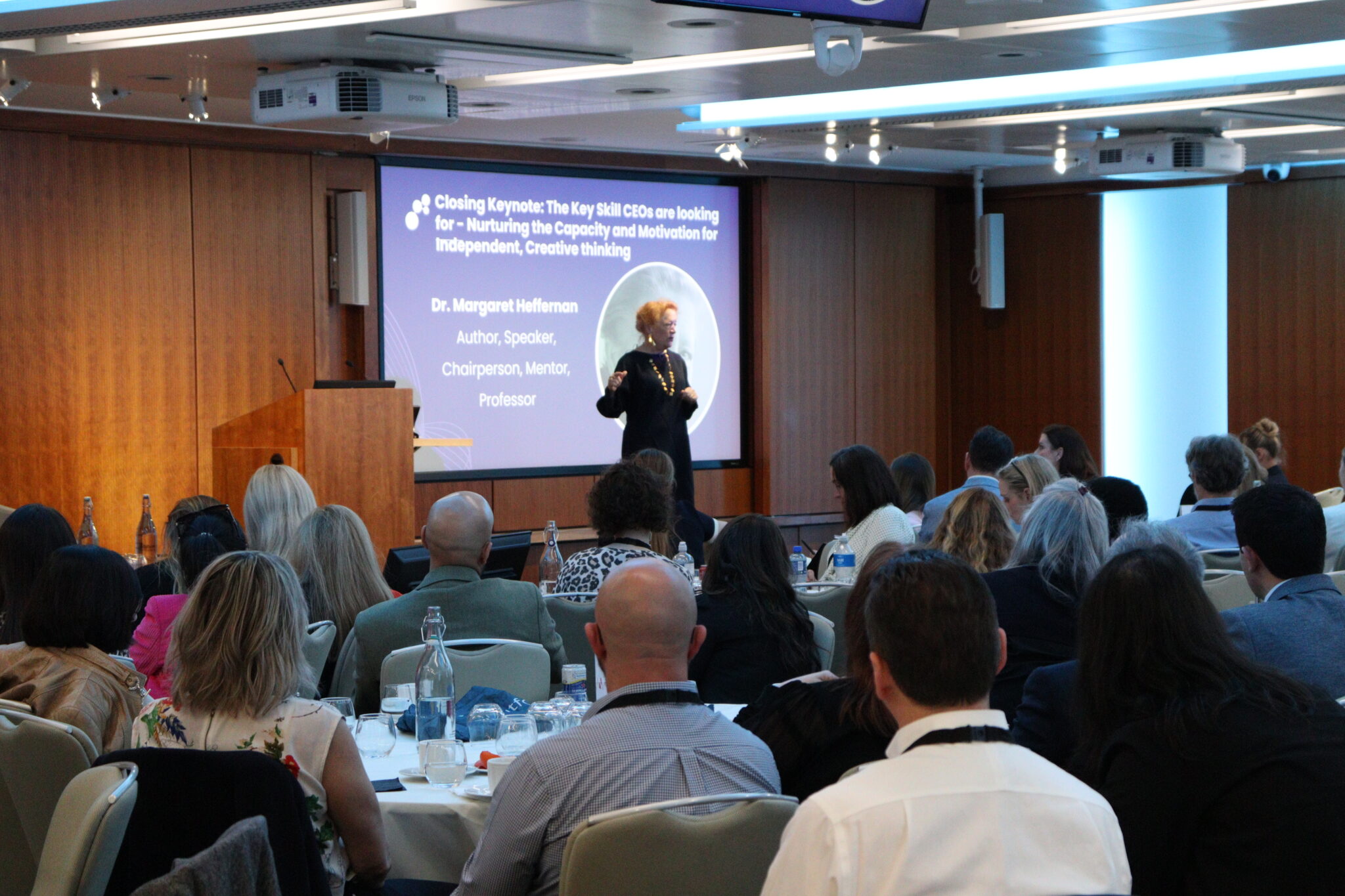At our recent Future of Talent Summit in March, Dr Margaret Heffernan delivered a compelling keynote on the fundamental skill that CEOs are increasingly prioritising in their workforce: independent, creative thinking. In a world where businesses have to continuously evolve to stay relevant, the ability to nurture curiosity, initiative, and adaptability is becoming a non-negotiable requirement for long-term success fit for the future of work.
The workforce dilemma: compliant but not creative
Dr Heffernan began with a thought-provoking observation: “Has there ever been a time where organisations didn’t complain about their workforce?” While many businesses acknowledge that they have employees who can competently execute their roles, they often lament a lack of initiative and independent thought. The modern workplace is filled with individuals who meet expectations but seldom challenge the status quo or bring forward innovative ideas.
This issue, she explained, is rooted in the way assessments and hiring processes have traditionally been structured. Many recruitment strategies favour candidates who align perfectly with predefined competencies – “model answers” – over those who think differently. “We have great obedient workers,” she noted, “but they aren’t creative or freethinking.” This leaves us with a workforce that excels at following instructions but struggles to generate new ideas or approach problems with originality.
Rethinking recruitment: Hiring for curiosity and adaptability
Dr Heffernan challenged the conventional wisdom of hiring for fixed job specifications, arguing that in reality, businesses often don’t know exactly what they’re hiring for. “What you’re hiring for now will be different in time,” she pointed out. “Their role will have changed in time too.”
Instead of seeking a perfectly square peg for a square hole, organisations should focus on hiring individuals who are “natively curious” – people who have an intrinsic desire to learn, explore, and adapt. “Curiosity sparks questions and sparks ideas,” she explained. “It means you need people that have initiative, that have agency.” In an unpredictable business landscape, having a workforce that thrives on learning and innovation is essential for sustained growth and success.
Learning as a lifelong journey
Dr. Heffernan emphasised that businesses cannot assume that today’s skill sets will be relevant tomorrow. “We don’t know what knowledge the future workforce is going to have, what skills they are going to have,” she said. “So, we have to find people that have a love of learning and are willing to adapt and grow.”
For organisations to evolve successfully, they must grow in tandem with their people. This requires a shift in mindset – not just at the individual level but within the leadership structures of companies. Businesses must become self-aware enough to recognise that “what got them to where they are, while successful, may not be the model or the process they need for the future.”
Cultivating a future-ready workforce
In an era of rapid technological change and shifting market demands, companies need employees who can think ahead, contribute ideas proactively, and embrace an entrepreneurial mindset.
“If you don’t know what the future holds, you need people that are thinking ahead,” Heffernan stated. “Willingly sharing their ideas, looking at what they can do differently, having that curiosity and initiative, a love of learning.”
The skills that will be most valuable in the future workplace, she argued, are not just technical capabilities but rather the human traits that drive innovation. “The skills that we need in the workforce are the skills that drive curiosity, exceptional resilience, creativity.” This journey of professional and organisational growth, she added, is rarely linear: “You start out hopefully, you end up finally, gratefully just happy to have arrived.”
The overlooked power of the creative economy
One of Dr Heffernan’s most striking insights was her emphasis on the role of creativity in driving innovation at a national and even global level. She pointed to the creative sector’s significant economic impact, noting that it is “bigger than aviation, automation, and pharma combined.” Despite this, the creative industries are often undervalued and underfunded.
Her argument highlighted an urgent need for policymakers and business leaders alike to invest in creativity – not just in the arts but across all sectors – if they hope to sustain innovation and remain competitive in the global economy.
The future is creative
Dr Heffernan’s keynote left the audience with a powerful message: “The future is creative.” In a business landscape defined by uncertainty and change, the most successful organisations will be those that cultivate a culture of curiosity, resilience, and independent thought. CEOs looking to future-proof their companies need to move beyond rigid hiring models and embrace a workforce driven by the motivation to learn, adapt, and innovate.
As companies look ahead, the challenge is clear: will they continue to prioritise obedience and conformity, or will they take bold steps to foster a culture of creative and independent thinking? The answer to this question may well determine the leaders and laggards of the future economy.
The Definitive Guide to Becoming a Skills-Based Organisation
This keynote took place at our Future of Talent Summit, where we unveiled our inaugural research report, The Definitive Guide to Becoming a Skills-Based Organisation. To unlock deeper insights into the future of talent strategies, purchase our full report and transform your approach to workforce planning.





